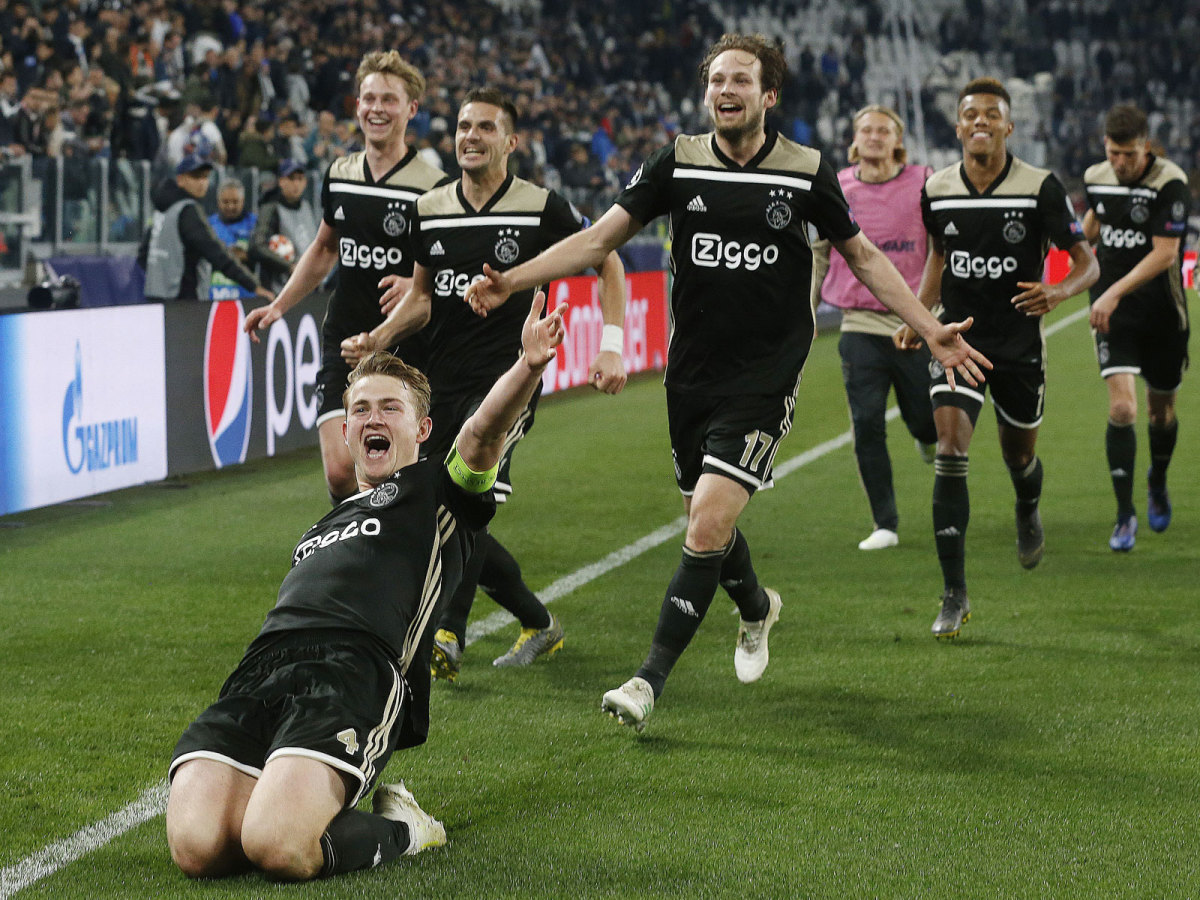The Beauty and Fragility of Ajax's Champions League Run

Every now and again, football offers something that cuts through all the cynicism and greed, that lifts the heart and stirs the soul. Why do we watch this game? Why do we care so much for it? It’s for moments like Tuesday, when a team like Ajax, brimming with youthful vigor, goes to one of the great citadels of European football and triumphs. It’s not just that Ajax beat Juventus, it was the way it did so. The attacking intent. The joy of their virtuosity. The sense of fun.
Now, of course, some caveats are necessary. Perspective here is everything. Neutral observers may regard Ajax, with its revenue for 2017-18 of $103 million, as an outsider punching well above its weight. But it is also a club that has won the European title four times before and is a giant in Dutch terms. It goes from minnow to leviathan depending on which pool it happens to be swimming at a given time. This is the way the world works: Ajax hoovers up local talent and has the resources to sign Daley Blind and Dusan Tadic from the Premier League and so dominates in the Netherlands, and then will have its top rising stars picked clean by wealthier clubs from elsewhere.
And that, perhaps, is part of the charm of this side. Its life will be short. In the summer, Frenkie de Jong will leave for Barcelona, and it would be no great surprise if half a dozen others left as well. It happened to Monaco after it reached the semifinals in 2017, and it happened to Porto after it won the competition in 2004.

In fact, that the squad has endured this long is itself a minor miracle. Last summer, Ajax’s chief executive, Edwin van der Sar, and its sporting director, Marc Overmars, called seven of the club’s brightest young stars to a meeting. All were explicitly compared to a great from Ajax’s past in an attempt to persuade them to stay one more year, to become legends in the Netherlands before leaving for money and potential silverware elsewhere. Of the seven, six were convinced. Only Justin Kluivert left, joining Roma.
De Jong was one of those in the meeting. So, too, was Matthijs de Ligt, who is only 19 but put on a performance of astonishing maturity in Turin, nullifying Cristiano Ronaldo for most of the game and scoring the winner. He is likely to join De Jong at Barcelona in the summer. Donny van der Beek, the midfielder who scored the equalizer against Juventus, also excelled against Real Madrid in the last round and is another unlikely to be short of suitors.
What makes this Ajax team so special? Goal-scoring hero and 19-year-old captain Matthijs De Ligt joined Planet Fútbol TV to tell us.
— SI Soccer (@si_soccer) April 16, 2019
Watch every episode with a FREE https://t.co/BZeW0yrbh3 trial https://t.co/oPFBz03Mf2 pic.twitter.com/8ZN9hM6D3U
That Barcelona will likely take at least two of this crop is no coincidence. Barcelona and Ajax have shared a philosophy since the days of Johan Cruyff–although the image many conjured of Cruyff looking down approvingly from heaven on Tuesday seems a little misleading. Cruyff being Cruyff, he would almost certainly be grumbling about some perceived heresy against his one true doctrine.
The path from Amsterdam to Barcelona is well-trodden and has been since the 1970s. Ajax, for a long time, has acted as a sort of unofficial feeder club for Barcelona. What is troubling now is just how vast the gulf between them has become. Barça’s revenues for 2017-18 were seven-and-a-half times those of Ajax–and that inequality is only getting worse.
Andrea Agnelli, Juventus's chairman, is one of those backing radical changes to the format of the Champions League so that it would feature four groups of eight, with extremely limited promotion and relegation. There is little doubt that clubs from smaller countries–the population of the Netherlands is 17 million–would be squeezed because their television market doesn’t generate sufficient revenue. And that, of course, only adds to the sense of this Ajax as a very fragile thing. It’s not just that this team has a limited life span. It’s that even the possibility of this team may not exist in the future.
When Louis van Gaal’s side won the Champions League in 1995, it seemed incredible. How could such a young side beat the elite? That success came 24 years after another young Ajax side had won its first European Cup. 24 years later, Ajax is three games from an even more extraordinary success. Football should enjoy it while it lasts, but also ask why it has created the conditions in which such beauty is so rare.
